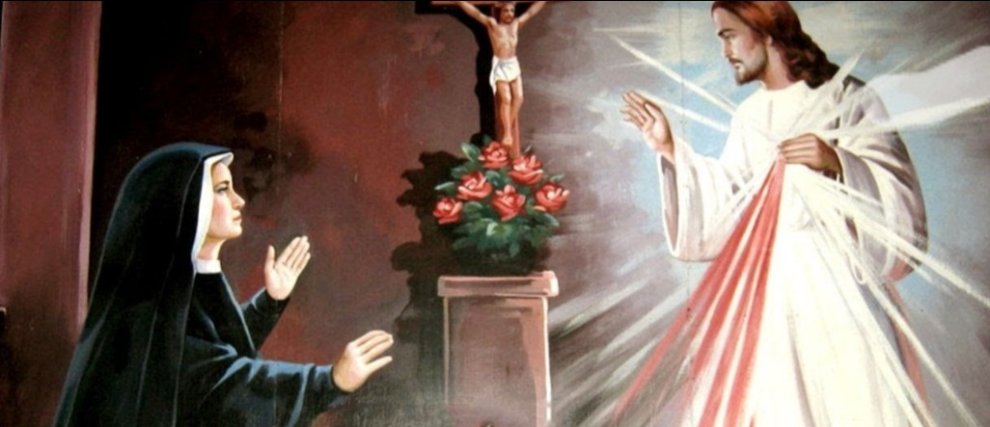Divine Mercy
The message of Divine Mercy entrusted to Saint Faustina
A message of love
The message of Divine Mercy comes three centuries after the revelation of the Sacred Heart to Saint Marguerite-Marie Alacoque in Paray-le-Monial. It complements and extends the message of the Sacred Heart: the heart is the source, mercy is the river that flows from it.
Saint Faustina, a humble Polish nun without education, was chosen by Jesus to transmit the message of Divine Mercy to the world. “I desire that the whole world may know my mercy” (D 687). The famous Diary of Sister Faustina reveals the message of Divine Mercy.
This message is an invitation to meet Jesus personally, to speak to him heart-to-heart. Like Saint Teresa of the Child Jesus, Saint Faustina teaches us a path of simplicity in our relationship with Jesus.
The essence of the worship of Divine Mercy is trust in God and the practice of mercy to one's neighbor. Trust is the condition for benefiting from Jesus' promises.
Saint Faustina has not ceased to insist on the immensity of God's mercy, which has no limits. Jesus specifies that sinners, misguided and unfortunate, have priority over his mercy. He says: “Let no soul be afraid to come near Me, even if its sins are scarlet.” (D 699).
A message for the world
Jesus told Saint Faustina that mercy is the last obstacle before justice is spread over this world.
Today we are witnessing a surge of evil and suffering in the world. Faced with this loss of reference, Divine Mercy is given to us as a last resort. There is an urgent need to implore God's mercy for our world, to make reparation for the sins committed, and to proclaim the message of mercy throughout the world. “Humanity will not find peace until it confidently turns to my mercy” (D 300).
Father Nicolas Buttet, founder of the Eucharistin Fraternity, says in a teaching: “God comes to challenge humanity today. We're at a turning point. Mercy is revelation, the last plank of salvation that God grants to humanity to return to Him. God gave Saint Faustina, undoubtedly the ultimate and greatest message that exists among private revelations, the secret of his mercy. This message is for everyone. There is an urgent need to make the revolution of love and it is up to us to make it. “
A message that is part of the biblical tradition
The message of God's infinite mercy entrusted to St Faustina is not a novelty in the history of the Church. Already, the long biblical tradition frequently uses the term mercy. The word “mercy” translates two terms in the Bible, it means womb and faithful love. In the Old Testament, God has, in particular, a motherly womb that trembles at the suffering of His people.
We also find the revelation of mercy in the New Testament. The gospel of the adulterous woman and the parable of the prodigal child are remarkable testimonies to this. Throughout history, thanks to the Holy Spirit, the Church will receive the increasingly precise revelation of this treasure that is mercy.
Mercy is the culmination of the revelation of the heart of God. It is the ultimate treasure of the mystery of God that is revealed to humanity.
John Paul II and the Message of Mercy
During his pontificate, Saint John Paul II endeavored to make the message of Saint Faustina known to the world. He said: “Divine mercy is the limit imposed on the evil of which man is the author and the victim”.
It was this Polish pope whom the Lord chose to pass on the message entrusted to a simple nun to the whole world.
John Paul II canonized Saint Faustina on April 30th, 2000. His lecture on this occasion is remarkable, here are some significant passages: “Through this act, I intend to transmit today this message of mercy to the new millennium. I transmit it to all men so that they may learn to know ever better the true face of God and the true face of their brothers. [...] Faustina, gift of God to our time, gift of the land of Poland to the whole Church, get us to perceive the depth of Divine mercy. (…) May your message of light and hope spread throughout the world, impel sinners to conversion, dispel rivalries and hatreds, incite men and nations to the practice of fraternity. “
The Apostles of Divine Mercy
One of the first apostles of divine mercy in the school of Saint Faustina was certainly Father Michel Sopocko, confessor of Sister Faustina in Vilnius. He worked until the end of his life to spread the worship of Divine Mercy. Despite the resistance of the clergy and the difficulties in spreading the worship requested by Jesus, he was not discouraged and patiently explained the theological foundations of worship and rectified errors.
Father Sopocko was the founder of the congregation of the sisters of merciful Jesus. This congregation responds to a request from Jesus. It is thanks to Blessed Michel Sopocko that the painting of merciful Jesus would become known and venerated by a large number of faithful.
There are many communities and associations whose mission is to spread the message of Divine Mercy, especially by encouraging all the devotions that are attached to it: the rosary of mercy, the , the hour of mercy, the Sunday of mercy.

